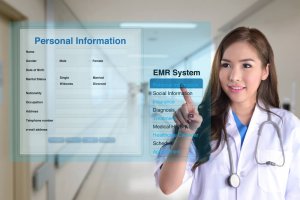Delaying the Adoption of Electronic Health Records
can Lead to an Increase in Medical Errors
Call 410-825-5287 for a free medical malpractice consultation
 Electronic health records (EHRs) have been shown to improve the quality of patient care provided by making each patient's individual medical history readily available precisely where and when it is needed. Medical errors decline significantly after the adoption of EHRs, as these records are interactive and analyze data as it is entered. When the system discovers the potential for an adverse drug reaction or another potential safety risk, an alert will immediately be sent to the clinician who can then make an appropriate adjustment in patient care. Additionally, EHRs are accessible by any health are provider with the patient's unique identification number, reducing the likelihood of medical errors when the patient is not being cared for by their primary care physician or is unable to respond to questions for any reason.
Electronic health records (EHRs) have been shown to improve the quality of patient care provided by making each patient's individual medical history readily available precisely where and when it is needed. Medical errors decline significantly after the adoption of EHRs, as these records are interactive and analyze data as it is entered. When the system discovers the potential for an adverse drug reaction or another potential safety risk, an alert will immediately be sent to the clinician who can then make an appropriate adjustment in patient care. Additionally, EHRs are accessible by any health are provider with the patient's unique identification number, reducing the likelihood of medical errors when the patient is not being cared for by their primary care physician or is unable to respond to questions for any reason.
EHRs Reduce Litigation Risk for Health Care Providers
To encourage the timely adoption of EHRs by all health care professionals, minor penalties have been set in place by the federal government that reduce the amount of Medicare payments physicians are able to receive if they continue using outdated paper records. However, a more significant incentive for providers who are hesitant to embrace technology within their practice may come from the reduced litigation risk that EHRs provide. With the use of prescription medications on the rise and the ever present potential for an adverse reaction, the analytical capabilities of EHRs can help reduce the number of prescription related errors by as much as 60 percent. When an EHR detects the potential for an undesired interaction between a new prescription and a medication the patient is already using, an alert can be sent to the physician who can then alter their recommendation.
The Use of EHRs Demonstrates a Commitment to Best Practices
Health care providers who adopt the use of EHRs are demonstrating their commitment to a set of best patient care practices. Should medical malpractice with a physician who utilizes EHRs occur, data will be readily available to support or refute potential claims. EHRs record evidence (or lack thereof) of informed patient consent; in many cases, patients are not provided clear information regarding a prescription or procedure and suffer undue harm as a result. Physicians can be held liable for negligence when they fail to obtain fully informed patient consent, but EHRs serve as strong evidence demonstrating the overall quality of care provided in each situation.
Medical Errors are the Third Leading Cause of Death
Considering that medical errors are now the third most common cause of death in the United States, it is clear that medical professionals can benefit from the assistance of computerized analytical tools which not only reduce their workload but can catch errors before potential adverse effects occur. EHRs also have the ability to improve the accuracy of patient diagnosis, as all medical data is readily available in one location and within an easy to read format. Results of health screenings and tests which were performed at another facility can be accessed directly through the EHR and help professionals develop a more complete assessment of a patient's condition. Misdiagnosis is associated with a significant number of medical malpractice lawsuits which can be extremely costly to health care providers. Even when physicians are meticulous in their review of a patient's medical data, it is difficult to approach the level of accuracy and completeness provided by an EHR.
A Reduction in Delayed Treatments
Once an appropriate treatment has been selected for each patient, maintaining a timely schedule is often a critical factor in its overall effectiveness, particularly in hospital settings where moments matter. EHRs can send reminders indicating the need to initiate another treatment round and help busy clinicians manage their responsibilities without overlooking any patient's specific needs. Again, potential litigation can be reduced while the overall quality of care and level of patient satisfaction increases.
Better Protection for Patients
EHRs can be reviewed in their entirety by a patient upon request. As a result, each individual has the opportunity to examine details regarding their own medical care and may have the information reviewed by another professional, if desired. Although physicians have long been required to disclose patient records, paper versions tend to be much more complicated and/or difficult to read. EHRs offer a higher level of patient protection through the enforcement of a greater level of required transparency in all medical interventions. Questionable treatments and/or acts of medical negligence are more easily verified by an independent source and will hopefully lead to an improvement in the level of responsibility taken during each step of care provided by all medial professionals.
Many Physicians Not Fully Utilizing the Potential of EHRs
As more consumers come to understand the importance of taking an active role in their own health care, working with a physician who is comfortable utilizing EHRs may increase in importance. In many cases, medical providers have been slow to ditch the habit of scribbling notes on paper rather then entering these same notes into the EHR where they become part of the patient's medical record. Considering the tremendous benefits to consumers, physician resistance to EHR adoption may be partly overcome by patient demand for a higher quality of care. Individuals searching for a new healthcare provider may be well served to inquire about the physician's level of familiarity and comfort with EHRs as a means of ensuring their own long term medical safety.
Accolades for Weltchek Mallahan & Weltchek
OVER $600 MILLION IN VERDICTS & SETTLEMENTS FOR OUR CLIENTS




